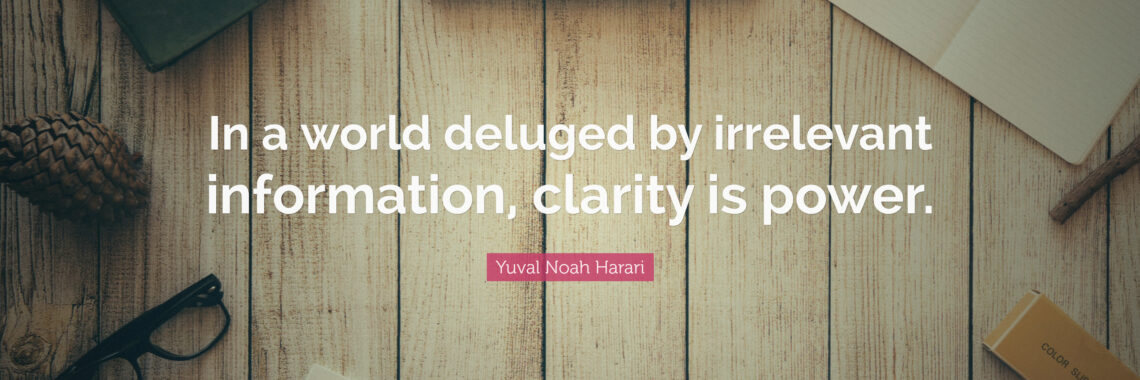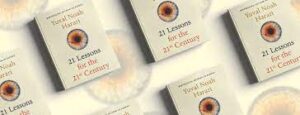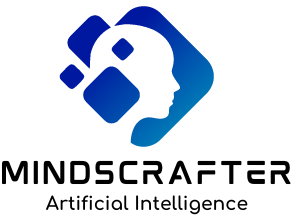
“In a world deluged by irrelevant information, clarity is power.”
From AI to Climate Change: How ’21 Lessons for the 21st Century’ Helps Us Face Modern Challenges:
In a world where technological advancements and environmental threats are rapidly changing how we live, it’s more important than ever to have a clear understanding of our challenges. That’s where “21 Lessons for the 21st Century” comes in. This thought-provoking book by Yuval Noah Harari provides a comprehensive analysis of some of the most pressing issues we’re dealing with today, from artificial intelligence to climate change. Through his insightful and engaging writing, Harari offers practical solutions for navigating these challenges and building a better future for ourselves and future generations. Whether you’re a tech enthusiast, environmentalist, or simply curious about the world around you, “21 Lessons for the 21st Century” is a must-read that will leave you feeling informed, inspired, and ready to take on whatever the future holds.

Understanding the challenges of the modern world – AI and automation:
Artificial intelligence (AI) and automation are two of the biggest buzzwords in the tech industry today, with many experts predicting that they will significantly impact the future of work. Harari explores this topic in detail in “21 Lessons for the 21st Century,” offering insights into how these technologies will likely impact our lives and how we can prepare for the changes ahead.
One of the key takeaways from the book is that while AI and automation may replace many jobs in the future, they will also create new opportunities for those willing to adapt and learn new skills. Harari argues that education will be a critical factor in determining who succeeds in the future of work and that we must be proactive in preparing ourselves for the changes ahead.
Another important insight from the book is the need for society to address the ethical implications of AI and automation. As these technologies become more advanced, they raise important questions about privacy, security, and the impact they may have on society as a whole. Harari believes that we must have open and honest conversations about these issues to ensure we use these technologies responsibly and ethically.
The impact of climate change and environmental challenges:
Climate change is one of the most pressing issues facing the world today, and Harari devotes an entire chapter of “21 Lessons for the 21st Century” to this topic. He discusses the science behind climate change and the political and economic factors that make it difficult to address.
One of the key messages from the book is that climate change is not just an environmental issue but also a political and economic one. Harari argues that we must address the underlying systemic problems contributing to climate change, such as our reliance on fossil fuels and a consumer-driven economy. He also emphasizes the need for collective action, noting that more than individual actions alone will be needed to solve this global problem.
Another critical point that Harari makes is the need for a shift in values and priorities. He argues that we need to move away from a culture of consumption and materialism and towards one that prioritizes sustainability and the well-being of our planet. This will require changes in individual behaviour and broader systemic changes, such as government policies and regulations.
Navigating political polarization and nationalism:
Political polarization and nationalism have become increasingly prevalent in many parts of the world, and Harari addresses these issues in “21 Lessons for the 21st Century.” He discusses how these trends impact society and offer insights into how we can address them.
Harari argues that political polarization and nationalism are often driven by fear and a sense of insecurity. He believes that one way to address these issues is through education, particularly in the areas of critical thinking and media literacy. By helping people develop these skills, we can empower them to think for themselves and make informed decisions rather than simply following the opinions of others.
Another vital point that Harari makes is the need for empathy and understanding. He believes that we need to be willing to listen to and understand people with different perspectives rather than simply dismissing them as “other.” This will require a shift in mindset and a willingness to step outside of our comfort zones.
Understanding the role of religion and spirituality in modern society:
Religion and spirituality are complex topics that have long been a source of debate and discussion. Harari tackles these issues in “21 Lessons for the 21st Century,” exploring religion and spirituality’s role in modern society.
One of the key takeaways from the book is that while religion and spirituality may have different meanings and interpretations for other people, they can both play an essential role in providing a sense of purpose and meaning in life. Harari argues that we need to respect people’s individual beliefs while also recognizing the importance of scientific and rational thinking.
Another important message from the book is the need to be open-minded and curious. Harari believes that by exploring different beliefs and perspectives, we can better understand ourselves and the world around us. He also emphasizes the need for humility, noting that we should be willing to acknowledge our limitations and biases.
Education and the Future of Work:
Education is a critical factor in determining who succeeds in the future of work, and Harari explores this topic in depth in “21 Lessons for the 21st Century.” He discusses how our current education system may need to prepare us for the changes ahead adequately and offers insights into how we can adapt and learn new skills.
One of the key takeaways from the book is the need for lifelong learning. Harari argues that to succeed in the future of work, we must be willing to learn and adapt continually. This may require developing skills in areas such as creativity, emotional intelligence, and problem-solving.
Another essential point that Harari makes is the need to move away from a one-size-fits-all approach to education. He believes that we need to be more flexible and adaptable and that we should focus on developing individual strengths and interests. This will require changes in our education system and a shift in mindset towards lifelong learning.
The importance of empathy and emotional intelligence:
Empathy and emotional intelligence are two critical skills that are becoming increasingly important today. Harari explores these topics in “21 Lessons for the 21st Century,” offering insights into why they are important and how we can develop them.
One of the key messages from the book is the need to develop empathy for others. Harari argues that by understanding and empathizing with people who are different from us, we can build stronger connections and create a more inclusive society. This will require a shift in mindset and a willingness to step outside of our perspectives.
Another critical point that Harari makes is the need to develop emotional intelligence. He believes that by understanding our own emotions and those of others, we can better navigate modern society’s complex social and emotional landscape. This will require developing skills such as self-awareness, self-regulation, and social skills.
How ’21 Lessons for the 21st Century’ provides a roadmap for addressing these challenges:
“21 Lessons for the 21st Century” is more than just a book about the challenges facing our world today. It’s also a roadmap for addressing these challenges and building a better future for ourselves and future generations.
Harari provides practical solutions for navigating the complex issues of AI and automation, climate change, political polarization, religion and spirituality, education, and empathy. He also emphasizes the importance of collective action, noting that we all have a role in creating a better world.
One of the key takeaways from the book is the need for a holistic approach to problem-solving. Harari argues that we need to consider the interconnectedness of different issues and focus on addressing the root causes of problems rather than just treating the symptoms.
Implementing the lessons in your own life and community:
While “21 Lessons for the 21st Century” provides valuable insights into the challenges facing our world today, the real impact of the book comes from putting these lessons into practice in our lives and communities.
We can apply the lessons from the book in many ways in our daily lives, such as by developing skills in areas like emotional intelligence, critical thinking, and creativity. We can also take action on issues like climate change by making changes to our behaviour and advocating for systemic changes.
On a community level, we can work to build stronger connections and promote empathy and understanding. We can also support organizations and initiatives that are working towards creating a better future for all.
Conclusion: The importance of facing and addressing modern challenges.
“21 Lessons for the 21st Century” is a powerful reminder of today’s challenges. Still, it also offers hope and practical solutions for navigating these challenges and building a better future. Whether you’re a tech enthusiast, environmentalist, or simply curious about the world around you, this book is a must-read that will leave you feeling informed, inspired, and ready to take on whatever the future holds. By facing and addressing these challenges head-on, we can create a better world for ourselves and future generations.
